4 Best Things To Buy In Aswan (A Local’s Guide)
6 min readAswan is famous for its colorful handicrafts – and items you won’t find anywhere else in Egypt. Here’s my ultimate guide to the best things to buy in Aswan.
From blue alabaster bowls and beaded jewelry to wooden dolls in colorful dress, Aswan has some of the most creative artisans in the country.
I’m a longtime expat living in Egypt and Aswan is one of my favorite places to shop for handmade and authentic souvenirs.
The markets in Aswan aren’t as flooded with Chinese fakes as some other places in Egypt. And they have a more chilled vibe where you’re free to shop without aggressive haggling.
Browse the market stalls in Aswan to discover crafts that reflect the local Nubian culture. Or pick up some fun souvenirs that are more recent innovations – like wooden crocodiles.
The Nubian people (an ethnic group who live in southern Egypt and northern Sudan) are some of the most kind people you’ll meet. They have their own language, culture and craft traditions– and they’re considered one of Africa’s oldest indigenous groups.
This rich Nubian culture is well worth exploring in the souqs of Aswan.
So whatever your taste, set aside some time for shopping on your Aswan itinerary for these unique handmade souvenirs.
The story of Aswan handicrafts
Aswan has a long history as a city of handicrafts and bustling commerce.
In Ancient Egypt, this Nile-side gem was known as sono, or “market,” and thrived as a commercial center that welcomed traders traveling to and from Nubia. It was known as the Land of Gold and provided much of the gold and stone that adorned Ancient Egyptian temples.
Aswan was called “the gateway to Africa” because it connected Egypt with traders from the rest of the continent.
Today you’ll find items like wooden masks and giraffe statues at local souqs that testify to the city’s link with broader African culture.
Aswan has a rich heritage of folk arts that include beadwork, palm branch and leaf creations and needlework. You’ll still see traditional clothing and jewelry worn at local weddings, funerals and celebrations.
Aswan is a UNESCO Creative City of Crafts and Folk Art, and boasts some 50 traditional folk dances, unique jewelry and original handicrafts. You’ll see this rich culture on display at the Aswan Museum and the Nubian Museum, which have departments that focus on preserving folk art from Aswan.
The people of Aswan overcame numerous obstacles to keep their local traditions alive, including the construction of the High Dam that flooded many Nubian monuments in the 1960s and left their heritage sunken under the Nile.
Today there are continual efforts to preserve local handicrafts and empower Aswan’s communities.
Where to shop in Aswan
Start at the souq at the marina (on your way to Philae Temple) for some great finds laid out on the docks. They include piles of statement jewelry and rings, carved wooden Bastet statues and handpainted bowls.
And don’t miss Sharia el Souq, a bustling downtown market with a more laidback vibe than many of Egypt’s more hectic tourist bazaars.
Wander down the sidestreets to uncover some unusual finds like Sudanese swords, stuffed crocodiles, wooden African masks, Nubian talismans and colorful caps and baskets handmade by Aswan women.
Here are the 10 best things to get in Aswan:
1. Baskets
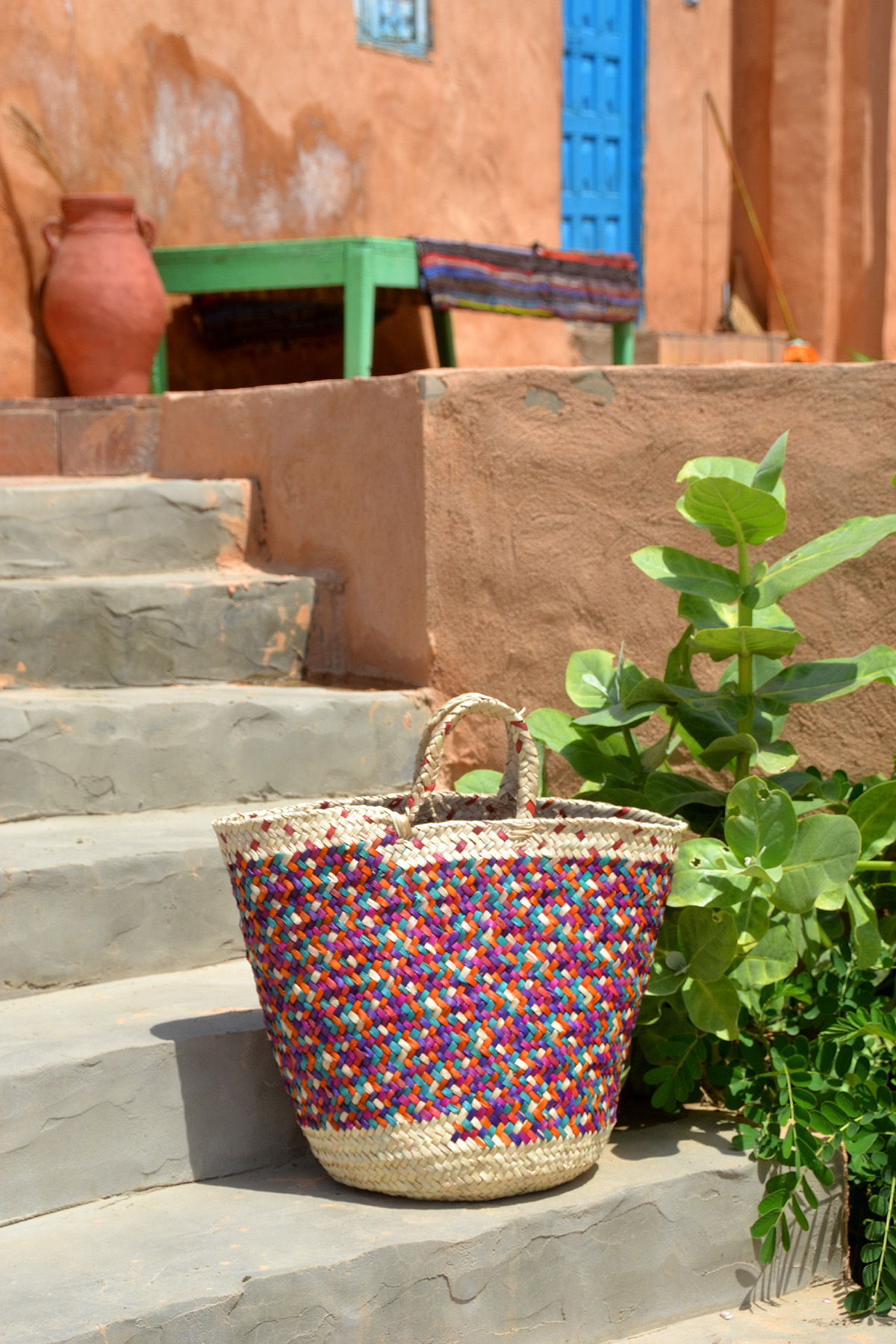

Aswan is known for its multi-color baskets woven by local women and sold across the city’s bustling souqs.
Aswan baskets are made from either doum palm leaves or date palm leaves, which are taken off the trees and dried. The baskets are a centuries-old craft that finds use for leaves that would otherwise go discarded.
The leaves are dyed to produce vibrant colors like canary yellow, green and deep red. Local women then weave the leaves together in multi-colored patters and bold stripes.
Insider’s tip: Aswan baskets have round bottoms that don’t fold easily into luggage. Use your Aswan basket as a carry-on bag and place your handbag inside. Most baskets fit easily under a plane seat or in the overhead compartment.
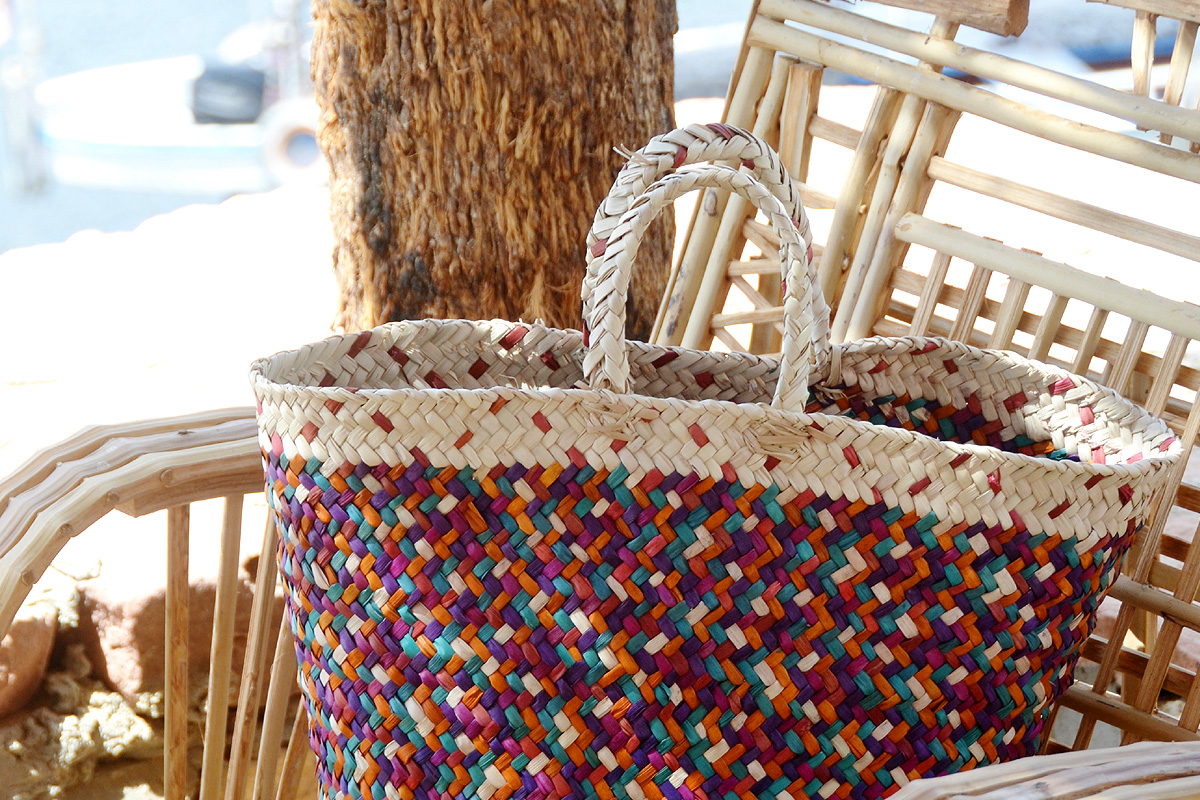

The baskets are largely woven by women in Naga’a Ghalalab, just west of Aswan, and are widely popular in the city’s markets.
You’ll find the best variety and selection of these baskets right in Aswan.
Fair Trade Egypt also has a great selection of Aswan baskets (shown above) at their shops in Cairo with locations in Zamalek and Heliopolis. They source the baskets directly from workshops run by Aswan women who are paid fairly for their work.
2. Dry hibiscus
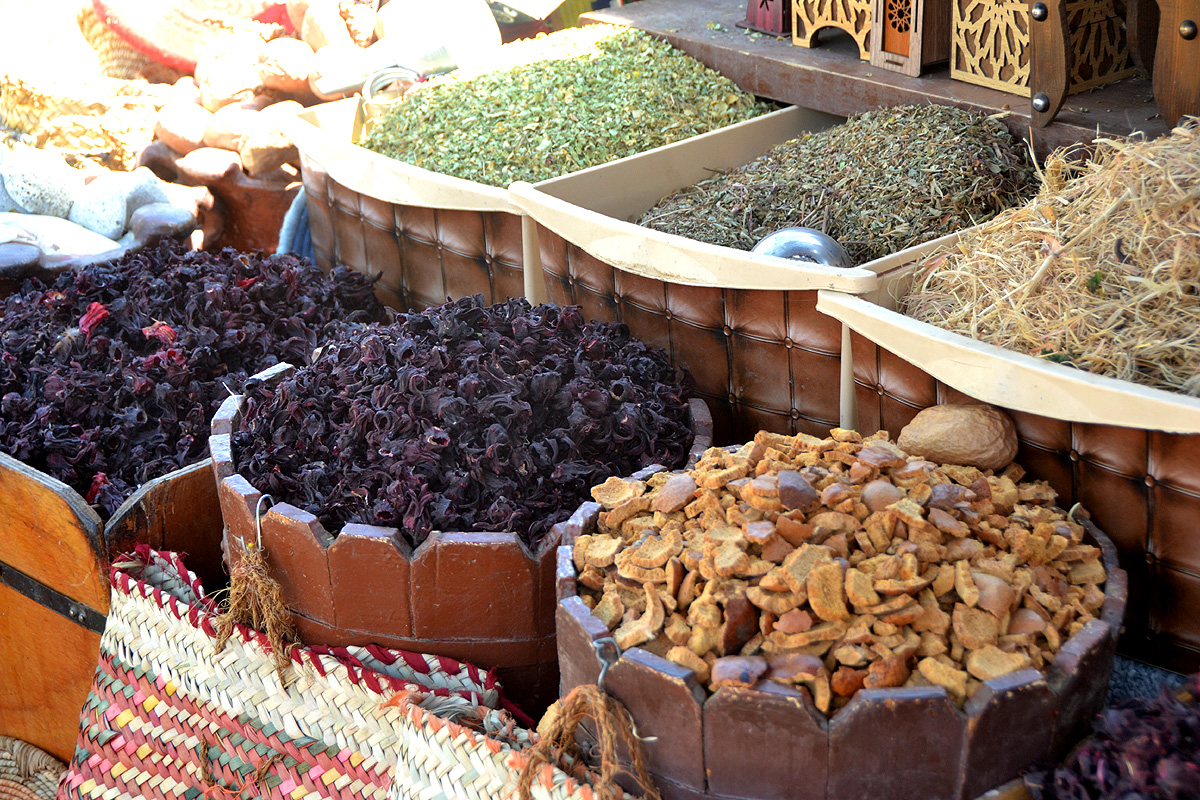

Sip on some iced karkadai to cool down after exploring Aswan’s dusty temples – and load up on the dried hibiscus flowers to make your own hibiscus at home.
Aswan is famous for the quality of its hibiscus. And you’ll find this popular drink everywhere from the cafe at Philae Temple to the stalls of Sharia el Souq.
Hibiscus is harvested every year in November with many young local men pitching in to the collective effort. The vibrant red flowers are picked off the branches. Then local women peel the flower petals off the seed pods and spread the petals out on their rooftops in the direct sun for drying. The dried petals are then ready and packaged for sale.
Hibiscus is very cooling in the hot Aswan summers and a great drink for blood pressure. It’s also easy to make at home by soaking the dried hibiscus flowers in water or boiling them. Serve the drink hot or ice cold, depending on your taste.
Hibiscus also makes a great gift for loved ones back home. Pack some dried hibiscus into decorative jars to gift friends and family.
3. Wooden crocodiles
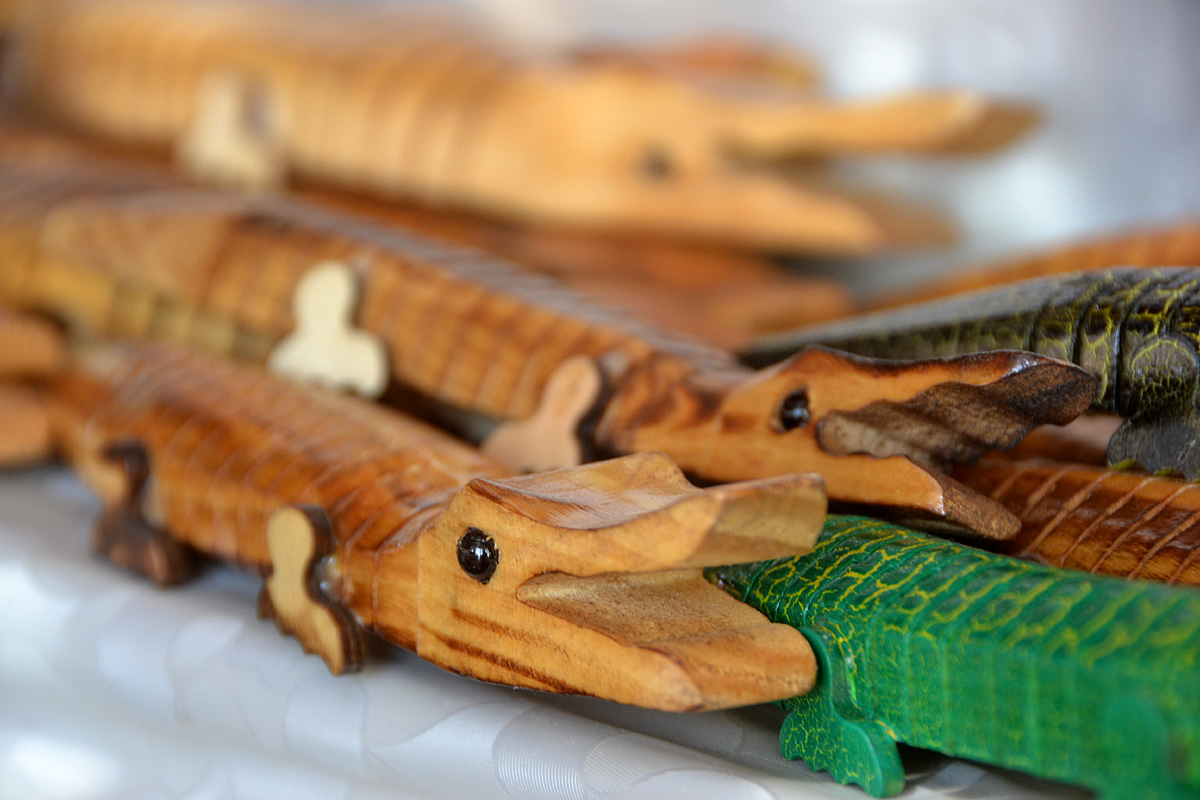

Wooden crocodile are a fun souvenir sold across Aswan that testify to the region’s deep affinity with the Nile animal.
The Nile crocodile played an important role in Ancient Egyptian culture – and the animal is still significant today in Nubian traditions.
At the nearby Temple of Kom Ombo, the crocodile god Sobek was worshiped as a deity associated with pharaonic power, fertility and military prowess. It was believed Sobek rose from primeval waters and created the Nile River from his sweat.
Crocodiles were mummified in ancient times and offered as sacrifices to Sobek. You can view dozens such crocodile mummies today at the Kom Ombo Crocodile Museum.
But the crocodiles that once basked on the ancient river banks all migrated south after the construction of the High Dam.
Today, stuffed crocodiles adorn the doorways of homes in the Nubian village.
And the cute wooden crocodiles are the latest incarnation of the region’s fascination with the king of the Nile.
4. Pharaonic style jewelry
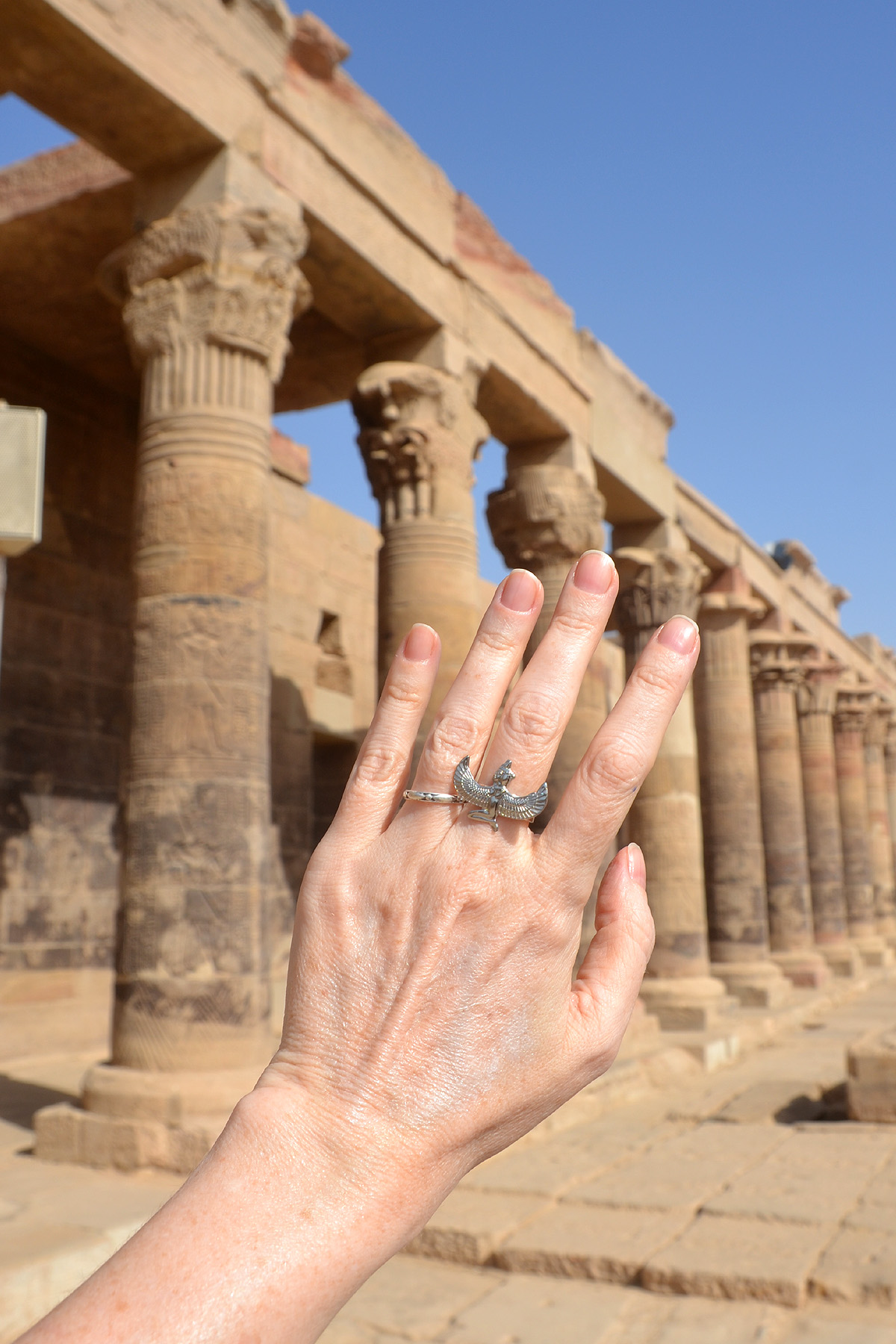

Egypt offers lots of jewelry with Ancient Egyptian themes from ankh rings and amulets to thick Cleopatra-style necklaces.
Some jewelry is more authentic than others. And pieces at Aswan’s souqs range from handcrafted items to cheap Made in China dupes.
Shop the stalls at the marina on your way to Philae Temple for bargain brass jewelry, especially rings with the figure of Isis (the chief deity at Philae).
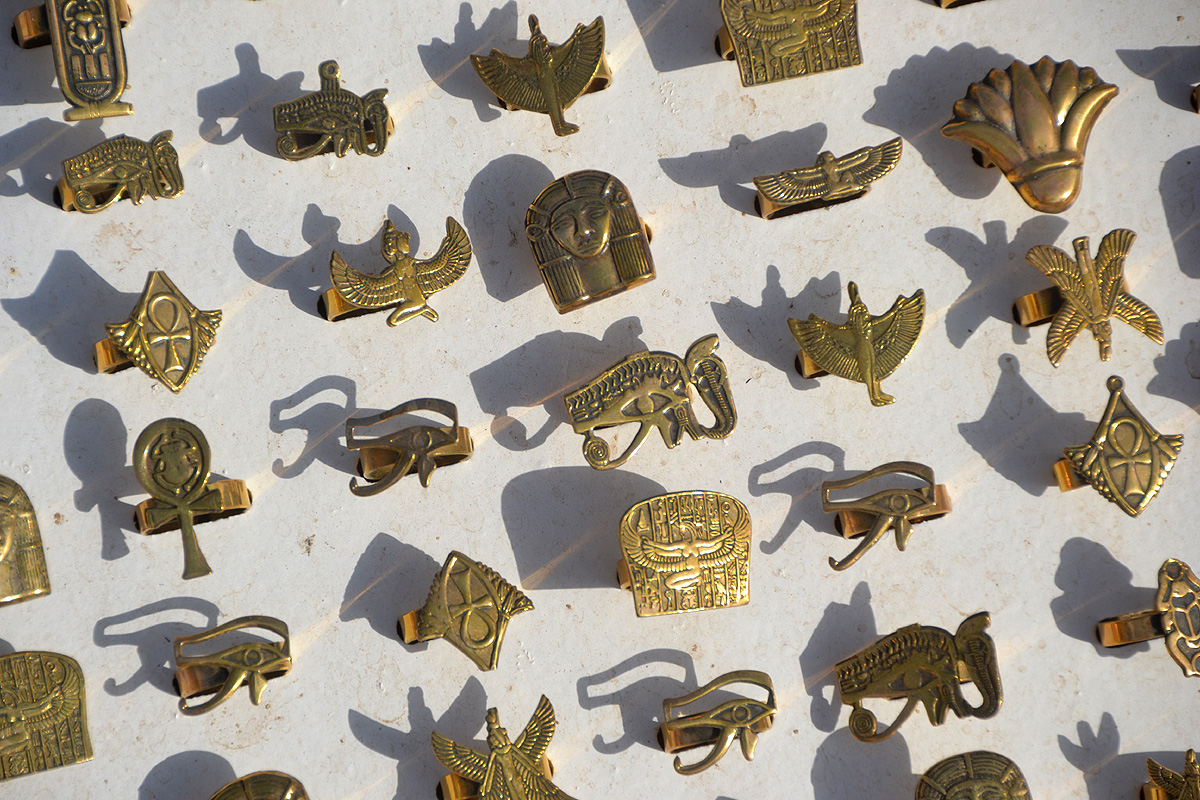

And if you’re looking for gold, Egypt has some of the most affordable prices in the world.
Head to Hanafi Bazaar for 18-carat gold jewelry and custom cartouche necklaces. Shop only at well-established retailers and make sure you get a receipt with the weight of the gold and a certificate of authenticity.



